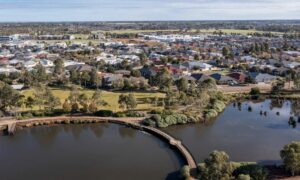Presented by Andrew Guild, Simon Bryce, Tim Woods
Reviewed Thursday 24th May 2012
Paul Eddington and Sir Nigel Hawthorn are both, sadly, long gone, but the unforgettable characters that they created from Sir Antony Jay’s and Jonathon Lynn’s witty scripts still live on through regular repeat seasons on television and DVDs. A quarter century later, the two writers have joined forces again and produced a full length play about the same group of political antagonists, updated to 2011 and referencing recent world affairs including climate change/global warming and illegal immigrants. The script is everything that you might expect, with the tricky situations, the Rt. Hon. Jim Hacker’s indecisions, Sir Humphrey Appleby’s deviousness, avoidance, and speeches filled with verbosity, which actually mean nothing, as well as poor Bernard Woolley’s awkwardness from being caught between the demands of the other two: his tenuous loyalty to the Prime Minister, and his need to keep his superior happy in order to retain his job.
This time we are taken away from the familiar locations of Whitehall and Number 10 Downing Street to a luxurious wood panelled room in the Prime Minster’s country retreat, Chequers; on a beautifully detailed set by Shaun Gurton. As well as his Principal Private Secretary, Bernard Woolley, and his Cabinet Secretary, Sir Humphrey Appleby, Jim Hacker has now acquired a Special Policy Advisor, Claire Sutton. Hacker is now leading a minority government and facing an economic crisis that is affecting all of Europe. The Rt. Hon. Prime Minister Jim Hacker MP is deep in the muck and floundering badly once again.
Also staying at Chequers is the Kumranistan Ambassador, who is offering salvation in the form of a ten trillion dollar loan in exchange for permission to lay an oil pipeline across Europe. It looks as though Hacker’s bacon is saved, but there is a catch that nobody had foreseen. The Kumranistan Foreign Minister (who does not appear on stage, his requests being delivered by the Ambassador) has a fetish for underage girls, and demands that he be supplied with one. Failure to satisfy his paedophilic lusts will mean that the deal is off and therein lays the moral dilemma that Hacker and the others must face. Dropping in for a live interview are the BBC cameraman and interviewer. The BBC was regularly causing problems for Jim Hacker in the original programmes, so it is only logical that they should continue to do so.
There are plenty of laughs in this production, but they are due to the script more than the performances, and extending what could easily have been another half hour long television programme into a two hour play does leave one thinking that less might well have been more. It seems to be spread a little too thin at times. One of Sir Humphrey’s convoluted and almost incomprehensible speeches would have been sufficient. More than one starts to look like padding out the script to achieve the length, and detracts from the cleverness of the device. The addition of a Special Policy Advisor also appears to reduce the involvement of Bernard Woolley. It feels rather as though the role has been split in two. Her presence also has a weakening effect on the relationship between Sir Humphrey and Jim Hacker. The conflict between the Government and the Civil Service that was central to the series is less clear.
Humphrey, of course, is still trying to maintain the status quo for the Civil Service whilst convincing Jim that he has, in fact, actually achieved some degree of change and improvement, or that his proposed changes will have a detrimental effect. At the same time, Humphrey is also looking to his own future and advancement.
It would be foolish to expect this production to be exactly like the television series, and it would be equally foolish for the director and cast to attempt to imitate the characters created by Paul Eddington, Sir Nigel Hawthorn and Derek Fowlds. Philip Quast, as Sir Humphrey, Mark Owen-Taylor, as Jim Hacker, and John Lloyd-Fillingham, as Bernard Woolley, reinterpret the roles, and Caroline Craig joins the trio as Claire Sutton, the morally deficient spin doctor.
For those with a good memory, some of the lines have been recycled from various episodes of the original series. What is missing, though, is that intimacy of television, the ability to show a close up of a facial expression at just the right moment. All of the laughs that came from those moments are missing from this stage production, a trait that has rendered previous attempts to transfer television programmes to the stage less successful than their avid followers had hoped. The secretiveness, conspiracies, and whispered asides are impossible when the cast has to project their voices to fill a 1,000 seat theatre.
There is a lot more physicality in the stage production, and bigger, broader characterisations, and that all tends to change the style, moving more towards farce. This performance does not always have the frenetic pace to really get the most out of that genre, though. Tom Gutteridge’s direction sometimes seems caught between two styles.
Philip Quast, Mark Owen-Taylor, John Lloyd-Fillingham, and Caroline Craig work hard in the four main roles and they come across well as British political figures. Quast’s twenty years working in England has given him not only a convincing English accent, but also a good feel for the flow and rhythm of the British way of speaking. Lloyd-Fillingham, of course, is English by birth. Owen-Taylor, too, does well, although Craig’s accent is a little inconsistent.
Quast fulfils the requirements of the role Humphrey very well, presenting that essential mix of pomposity, assumed superiority, inflexibility and deviousness that are the trademarks of the character. He literally flies through those tongue twisting bursts of politico-babble with aplomb, and manages to keep a straight face whilst doing so.
Owen-Taylor, in the role of Jim Hacker, blusters and flusters, descending at times into total panic and is reduced to a screaming heap, reminiscent of John Cleese’s Basil Fawlty. He regains his composure when interviewed by the BBC and, as politicians are wont to do, answers questions that they did not ask, while avoiding the topics that they wanted to cover. Owen-Taylor covers all this ground with ease, and also does very well with his imitation of Sir Winston Churchill, in the middle of the BBC interview.
Lloyd Fillingham’s Bernard attempts to maintain a moral compass and keep Sir Humphrey and Hacker from falling into an ethical abyss. His naivety actually makes him think that he has a chance of so doing. Lloyd Fillingham’s interpretation of the role is very physical, getting well away from the original characterisation in a fresh, new approach to the role, but still with those endearing qualities of the original.
Caroline Craig’s Claire Sutton can almost be seen as Bernard’s dark side, the Mr. Hyde to his Dr. Jekyll. Her portrayal of Claire gives us an efficient assistant and willing ally for hacker, not allowing emotion to interfere with political expedience.
Alex Menglet’s Kumranistani Ambassador is well-characterised and he easily makes his Foreign Minister’s illegal and immoral request seem like a benefit to everybody and the economy in general. Menglet would have impressed Arthur Daley with the way in which he twisted the conversation from one extreme to the other in selling his distasteful request.
Tony Llewllyn-Jones is Jeremy Burnham, the Director General of the BBC, who arrives to talk of an upcoming programme that is not at all what the quartet need at the moment. Llewllyn-Jones neatly negotiates the twists and turns in Burnham’s conversation around to a need for more money for the BBC, to which Hacker has no choice but to acquiesce.
There is, naturally, the attraction of a certain degree of nostalgia attached to this production, and the numerous one-liners and humorous situations provide some big laughs, adding to its appeal. It follows the general format of the television series but is a vastly different realisation and, although entertaining, does not quite capture the original atmosphere. It is, however, a very enjoyable evening of theatre that will send you out, still smiling.
Reviewed by Barry Lenny, Arts Editor, Glam Adelaide.
Yes, Prime Minister web site
Adelaide Festival Centre web site
Venue: Her Majesty’s Theatre, Grote Street, Adelaide
Season: to 27th May 2012
Duration: 2hrs 30mins (incl. interval)
Tickets: $49 to $89
Bookings: BASS 131 246 or here





















